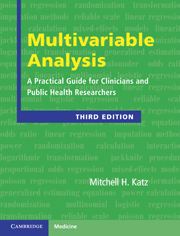Book contents
- Frontmatter
- Contents
- Preface
- 1 Introduction
- 2 Common uses of multivariable models
- 3 Outcome variables in multivariable analysis
- 4 Independent variables in multivariable analysis
- 5 Relationship of independent variables to one another
- 6 Setting up a multivariable analysis
- 7 Performing the analysis
- 8 Interpreting the results
- 9 Delving deeper: Checking the underlying assumptions of the analysis
- 10 Propensity scores
- 11 Correlated observations
- 12 Validation of models
- 13 Special topics
- 14 Publishing your study
- 15 Summary: Steps for constructing a multivariable model
- Index
- References
13 - Special topics
Published online by Cambridge University Press: 01 April 2011
- Frontmatter
- Contents
- Preface
- 1 Introduction
- 2 Common uses of multivariable models
- 3 Outcome variables in multivariable analysis
- 4 Independent variables in multivariable analysis
- 5 Relationship of independent variables to one another
- 6 Setting up a multivariable analysis
- 7 Performing the analysis
- 8 Interpreting the results
- 9 Delving deeper: Checking the underlying assumptions of the analysis
- 10 Propensity scores
- 11 Correlated observations
- 12 Validation of models
- 13 Special topics
- 14 Publishing your study
- 15 Summary: Steps for constructing a multivariable model
- Index
- References
Summary
What if the independent variable changes value during the course of the study?
Let's say that over the course of a longitudinal study a subject's value changes on an independent variable. This may happen because the patient quits (or starts) a habit such as smoking, begins a new medicine, or develops a new symptom or illness. How can you deal with this in your analysis? The answer is that within proportional hazards analysis you can create time-dependent variables. These variables change value at a particular point in time. So, instead of having a variable such as smoking at baseline (yes/no), you create a time-dependent variable, where each subject is 0 (nonsmoker) or 1 (smoker) at a particular point of survival time.
DEFINITION
Time-dependent covariates allow incorporation of changes in the independent variables that occur during the study.
In the simplest case, time-dependent variables change their value only once (e.g., a nonsmoker starts to smoke – the variable is 0, 0, 0, at several points in time before the subject begins smoking and then the variable changes value to 1 at the time the subject begins smoking and remains 1 for the remainder of the observational time). It is also possible to construct time-dependent variables that change their value back and forth multiple times (reflecting what sometimes happens when smokers try to quit).
Information
- Type
- Chapter
- Information
- Multivariable AnalysisA Practical Guide for Clinicians and Public Health Researchers, pp. 213 - 220Publisher: Cambridge University PressPrint publication year: 2011
